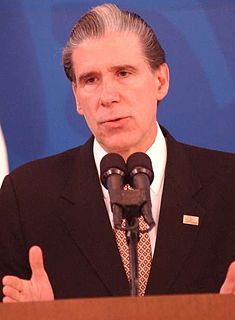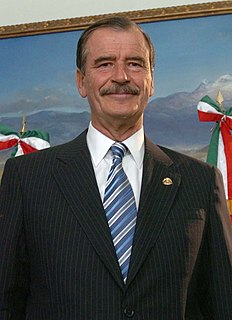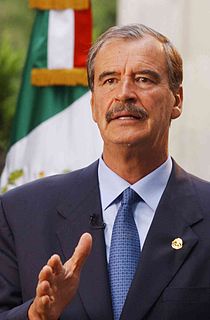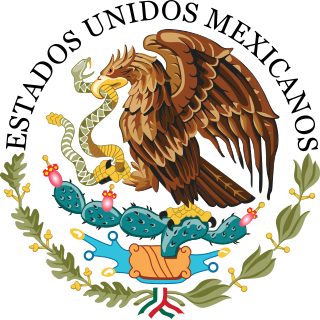
The National Action Party, founded in 1939, is a conservative political party in Mexico, one of the three main political parties in Mexico. Since the 1980s, it has been an important political party winning local, state, and national elections. In 2000, PAN candidate Vicente Fox was elected president for a six-year term; in 2006, PAN candidate Felipe Calderón succeeded Fox in the presidency. During the period 2000-2012, both houses of the Congress of the Union contained PAN pluralities, but the party had a majority in neither. In the 2006 legislative elections the party won 207 out of 500 seats in the Chamber of Deputies and 52 out of 128 Senators. In the 2012 legislative elections, the PAN won 38 seats in the Senate, and 114 seats in the Chamber of Deputies. The members of this party are colloquially called Panistas.

Álvaro Obregón Salido was a general in the Mexican Revolution, who became President of Mexico from 1920 to 1924. He supported Sonora's decision to follow Governor of Coahuila Venustiano Carranza as leader of a revolution against the Huerta regime. Carranza appointed Obregón commander of the revolutionary forces in northwestern Mexico and in 1915 appointed him as his minister of war. In 1920, Obregón launched a revolt against Carranza, in which Carranza was assassinated; he won the subsequent election with overwhelming support.

Felipe de Jesús Calderón Hinojosa, is a Mexican politician who served as President of Mexico from 1 December 2006 to 30 November 2012. He was a member of the National Action Party for thirty years before quitting the party in November 2018.

Julio José Frenk Mora is a Mexican physician and former secretary of Health of Mexico. Frenk is currently the president of the University of Miami. He is the University of Miami's first Hispanic and native Spanish-speaking president. Frenk formerly served as dean of the faculty and T & G Angelopoulos professor of public health and international development at the Harvard School of Public Health, from 2009-2015, where he had been the university's first Hispanic and native Spanish-speaking dean.

Fernando de Jesús Canales Clariond is a Mexican politician and businessman affiliated with the National Action Party (PAN). He succeeded his cousin, Benjamín Clariond as governor of Nuevo León in 1997. He also served as Secretary of Economy and as Secretary of Energy in the cabinet of Vicente Fox.

Ramón Martín Huerta was a Mexican politician affiliated with the National Action Party (PAN). He served in Vicente Fox's cabinet as Public Security Secretary.
Víctor Manuel Camacho Solís was a Mexican politician who served in the cabinets of presidents Miguel de la Madrid and Carlos Salinas. Born in Mexico City to Manuel Camacho Lopez and Luz Solís, he belonged to the Frente Amplio Progresista. At first he was affiliated with the PRI, later with the Party of the Democratic Center and then with the Party of the Democratic Revolution.
Francisco Javier Salazar Sáenz is a Mexican politician affiliated with the National Action Party (PAN). He was the Secretary of Labor from 2005 to 2006.

The Mexican Office for Domestic Affairs is the public ministry concerned with the country's domestic affairs, the presenting of the president's bills to Congress, their publication and certain issues of national security. The country's principal intelligence agency, CISEN, is directly answerable to the Secretary of the Interior. The Secretary is a member of the President's Cabinet and is, given the constitutional implications of the post, the most important Cabinet Member. Additionally, in the absence of the President, the Secretary of Interior assumes the job of the President and so, in this matter, the Secretary is similar to a Vicepresident. The Office is practically equivalent to Ministries of the Interior in most other countries and is occasionally translated to English as Ministry, Secretariat or Department of the Interior.
Abascal is a Spanish surname. Notable people with the surname include:

Gabino or Gavino Gaínza y Fernández de Medrano was a Spanish military officer and politician in Spain's American colonies. During the Latin American wars of independence, he initially fought on the royalist side, in Chile. Later, in Guatemala, he supported independence and became the first president of a united Central America extending from Soconusco through Guatemala, El Salvador, Honduras, Nicaragua and Costa Rica.
The Televisa Law is the name given by the press to the Federal Law of Radio and Television, a controversial law approved by the Congress of Mexico in 2006, shortly before the presidential election. This law concentrates on the deregulation of the digital spectrum to be assigned to the two national television networks in the country: Televisa and TV Azteca.

Vicente Fox served as President of Mexico from December 1, 2000 to November 30, 2006. His victory in the federal elections in 2000 ended more than 70 years rule of the Institutional Revolutionary Party.

Gaspar Jesús Melchor Flores Magón was a Mexican politician, journalist, and jurist. The more moderate middle brother of Ricardo and Enrique Flores Magón, he served in the cabinet of Francisco I. Madero.
Juan Francisco Molinar Horcasitas was a Mexican politician and academic. A member of the National Action Party, he served as a federal deputy and, between 2 December 2006 and 2 March 2009, director of the Mexican Social Security Institute.
Basque Mexicans are Mexicans of full, partial, or predominantly Basque ancestry, or Basque-born persons living in Mexico.
Carranza is a Hispanic surname. Notable people with the surname include:


















